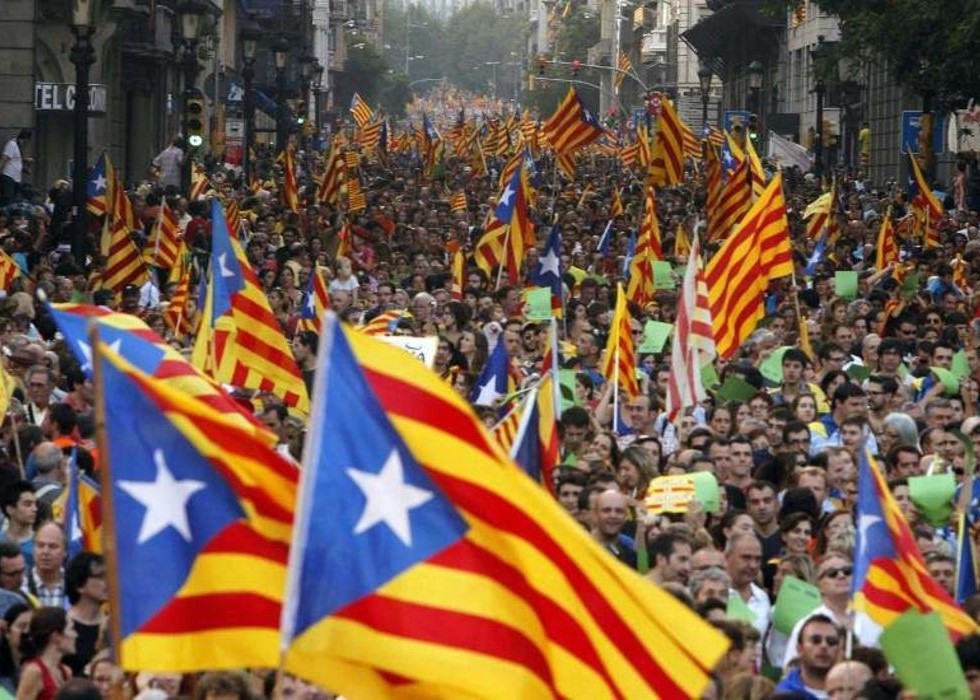BARCELONA – Five years ago, referendum 1-O took place by which the independence movement in Catalonia hoped to make the autonomous region an independent republic. 1-O became a major challenge to the state and the constitution.
It states that a Spanish nation is an inseparable unit. The first day of October 2017 was very turbulent. Images of police brutality to stop the referendum declared illegal went viral. Subsequently, based on the result of the referendum, the then government of Catalonia declared Catalonia symbolically and unilaterally independent. Subsequently, the national government dismissed the Catalan government based on the Spanish Constitution. As a result, the autonomy of Catalonia was suspended for seven months.
Several political leaders were subsequently convicted and jailed for their involvement in the illegal referendum and subsequent declaration of independence. Below is ex-president Carles Puigdemont, who is still a fugitive in Belgium.
The independence movement has maintained for five years that the referendum result backed that declaration of independence with 90% of the vote. Still, the referendum was illegal because the state government passed unconstitutional laws overnight to allow the referendum to go ahead.
Demonstration in Barcelona
Led by Puigdemont, the Consell per la República, along with other pro-independence entities, staged a demonstration. This one will travel through the streets of Barcelona. The ANC has also organized a memorial action at Plaza Sant Jaume.
Five years later, the independence movement that grew rapidly in Catalonia after the autumn of 2017 seems to have lost its unity. The current government, made up of ERC and JxCat, the same who ruled five years ago, is on the brink of collapse. Last Wednesday, ‘president’ Pere Aragonès (ERC) fired Vice President Jordi Puigneró (Junts). As a result, Junts has scheduled a meeting with its members to decide whether or not to leave the government.
Without a clear project to achieve independence
The background of the crisis lies in the lack of a common project to achieve the independence of Catalonia. Independence from Spain is the only thing both sides have in common. But how this is to be achieved differs.
Not wanting to repeat 1-O’s mistakes, ERC is calling for a referendum agreed with the government, whose outcome is legitimate and binding. But JxCat does not waive the 2017 outcome, deeming it valid enough to resume the unilateral road to independence. Catalonia’s third party for independence CUP has long since ceased parliamentary support for the government. This party is more in line with JxCat’s position on how to achieve independence.
‘No’ to independence at 52.2%
The latest barometer from the Catalan CEO (dependent on the Generalitat) in July put the ‘no’ to independence at 52.2%, the highest figure since 2015. The waning enthusiasm of the independence movement was very evident on September 11. This national holiday of Catalonia was for many years a good thermometer of the feeling of independence in the streets. However, this year’s march was the one with the lowest turnout since 2012.
The government of Sánchez (PSOE in coalition with Unidas Podemos) has acknowledged the existence of a “political conflict” in Catalonia. Also, the government has agreed that it is necessary to “overcome the legal process” and to promote and protect the Catalan language.
Furthermore, the government is promoting a reform of the criminal code to change the crime of sedition. For this, the court condemned the main leaders of 1-O. This change could benefit other pro-independence leaders who are still awaiting trial. The prisoners of the “trial” have also been released thanks to the government’s pardon.
Ongoing lawsuits
Meanwhile, the Catalan ‘trial’ has not yet settled all accounts with the judiciary. 30 charges are still being processed for organizing it. In addition, there are thirty charges against the Puigdemont government and businessmen being prosecuted for involvement in the organization of the 1-O-referendum.
But it’s not just organizers waiting for their trial. More than 40 state police officers under investigation for 1-O’s charge, which injured 893 people (according to the Generalitat’s figures at the time), are still waiting. The Interior Ministry also estimated the number of injured officers at 431.
Meanwhile, three leaders remain on the run from rebellion: Puigdemont himself and former ministers Toni Comín and Clara Ponsatí. So is the former minister Lluís Puig, accused of disobedience and embezzlement. The future of these leaders is also in the hands of the Court of Justice of the EU, which must decide the scope of the arrest warrants.
Finally, an appeal has been lodged with the Constitutional Court against the pardons of the nine leaders who were convicted and imprisoned: Junqueras, Raül Romeva, Jordi Turull, Dolors Bassa, Carme Forcadell, Joaquim Forn, Josep Rull, Jordi Sánchez and Jordi Cuixart. The Constitutional Court must decide on the validity of the grant of pardon that annulled the prison sentences (but not that of disqualification).


